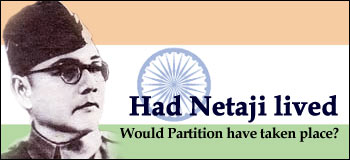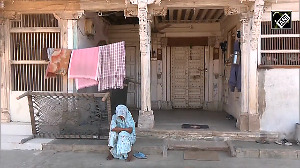
It is only in the last few years that January 23, the day Subhas Chandra Bose was born, has begun to be celebrated across the nation. Over a century after his birth in 1897, public attention is still focused on the mystery surrounding his death on August 18, 1945. Even if he had survived that plane crash, it would be surprising if he is alive today.
What is fascinating is whether the Partition of India would have taken place if he had survived. As Pakistan, that illegitimate child of British imperialism, totters on the brink of failure, as the world increasingly sees it as the epicentre of evil, what could have been the fate of India if Bose had lived?
Some excerpts from a forthcoming book Colonel (retired) Anil Athale co-authored with Lieutenant General (retired) Eric Vas, an eyewitness to many events.
August 17, 1945. The gloom at Saigon airport was overpowering. A small party -- a few Indians, some officers of Japan's Southern Army -- had assembled on the tarmac to bid farewell to Bose.
Bose disliked tearful farewells and asked the Indians to leave after a brief goodbye. He asked the Japanese Air Force officer if he could have the use of a staff car for one hour; he wished to call on a friend.
After a short drive, the car reached a small, detached house in the suburbs. Bose alighted, told the driver to wait, and asked Habib Rehman to accompany him.
They entered a small compound and walked along a flagstone pathway flanked with flowering bushes leading up to a small cottage. Bose turned the doorknob, entered unannounced, then closed and bolted the door.
He called out, "Robin. Are you there?"
Rehman was astonished to see a tall, handsome man, a splitting image of Netaji, stride into the room. Not only did this man walk like Bose, but he was also dressed in a khaki drill uniform with polished jackboots and a forage cap of exactly the same pattern as the Netaji's. He wore spectacles and looked a mirror reflection of Bose.
"Habib, I would like you to meet Rabindra Nath Ghosh, who will be accompanying you to Manchuria."
***
Nora Harris (Noor Inayat Khan) was a remarkable woman in more ways than one. Her striking good looks and large black eyes were only a minor part of her persona. Her linguistic skills were a phenomenon. Blessed with an elephantine memory she was an intelligence man's dream come
true. It was but natural that she caught the eye of MI-6, desperate to bolster its network before D-Day.
Nora was inducted into Spain in 1943. From there she had slowly made her way, as a Spanish waitress, into the Cherbourg peninsula by December. Her brief day in the sun came when she and her group of French Resistance fighters cleared the way for Americans who landed at the Utah beach.
Decorated by both the American and British governments for her contributions to the Allied success in the Normandy landings, Nora looked forward to complete her studies. De-inducted from France in August 1944, she spent the rest of 1944 and most of 1945 behind a desk. Then came Victory in Europe Day and Nora began dreaming of her return to Cambridge.
But Nora was in for a shock when instead of the promised return to academics, she was transferred to India on a top secret assignment.
At times like this she needed her godfather's advice. She spoke to Professor Cecil Townsend and invited herself to Cambridge.
"Why is Churchill so obstinate when it comes to the issue of India?" Nora asked.
The professor laughingly told Nora the first thing wrong with his friend Winston was he was from Oxford and not Cambridge. But on a more serious note, Professor Townsend felt imperialists did not understand the British Empire, though won by the sword, had survived due to the British spirit of liberalism, their strong sense of justice and fair play.
"While the rapacious Spanish colonies revolted, the British rule continued to flourish," he pointed out. "It is the lack of understanding of this ethical dimension by individuals like Churchill that make them ignore the reality. Even Warren Hastings, nearly a century-and-half ago, clearly saw the British rule over India was transitory."
On hearing this, Nora told the professor the terrible secret she had learnt at MI. India was to be divided on religious lines between Hindus and Muslims and the operation was codenamed Akbar. Nora could take the liberty of sharing this secret with the professor as she knew he had worked for MI in an advisory role throughout the war.
Townsend wryly noted that naming the operation after one of the greatest promoters of peace between Hindus and Muslims showed a typical Churchillian sense of humour. He was not surprised at what Nora told him. He could see it coming since 1942 when Gandhi launched the Quit India movement at a most awkward time for the British and drove them into Jinnah's arms.
"Churchill and England do not realise they are creating a Frankenstein," the professor said.
It was at that very moment she made a decision; she, the great granddaughter of the Tiger of Mysore, was going to stop it from happening. She made up her mind to accept the assignment and do everything within her power to undermine Operation Akbar.
***
News of Netaji's death was released by the Imperial General Headquarters on August 23, 1945, and reached the outside world only when news of the accident was broadcast from Delhi the same day.
Nine senior Indian officers and ministers who were by then trying to follow him stopped wherever they happened to be, stunned and confused. Some refused to believe what they had heard was true; this was probably Netaji's plan to escape arrest. Others accepted there had been an plane crash and hoped Bose would somehow have survived. A few believed he had died but prayed for a miracle and his reappearance.
Lord [Archibald Percival] Wavell [then viceroy] was sceptical when he heard the news. In his journal he wrote: I wonder if the Japanese announcement of Subhas Chandra Bose's death is true. I suspect very much, it is just what would be given out if he meant to go underground. My first reaction when I heard it was to tell the PSV [private secretary to the viceroy] to make most careful inquiries into the story as soon as they could. If it is true, it will be a great relief. His disposal will have presented a most difficult problem.'
***
On March 9, 1947, Bose told his confidants details of his plan to make a sudden dramatic appearance in Calcutta. His men in Bengal and eastern India, he said, would announce his presence in every village and town. Leaflets would also be distributed throughout India in every national language to explain the people must be peaceful, protect the lives of British citizens and minorities, and ensure communal harmony. Bose's aim was to effect a non-violent psychological takeover of eastern India.
This would disarm the authorities, display his ability to maintain law and order, and give the British no opportunity to accuse him of indulging in subversive activities. His next step would be to win legitimacy in the interim government and gain the loyalty of the unified armed forces.
The flight to Calcutta lasted barely 40 minuets but it felt like eternity. Bose, who was dressed in a grey shirt and khaki trousers, was in a sombre mood. As the Dakota began to circle Calcutta city, the cabin crew began dropping tri-coloured leaflets, which fluttered down presenting a dazzling mixture of saffron, white and green.
When the aircraft began to descend to the Dumdum airport, the sprawling metropolis of Calcutta came into focus. Bose witnessed a most amazing sight. The road from Dumdum was jam-packed with people. Netaji's earlier sombre mood gave way to quiet excitement.
As the jeep slowly moved forward over the 22-km stretch, the crowd waiting along the route began to join the huge procession. By the time he entered the city limits, some sort of order was restored. Loudspeakers repeatedly made announcements Bose would address the people at Brigade grounds.
At the venue Bose climbed on to a makeshift platform. A full-throated roar rent the air. 'Netaji Bose Zindabad' [Long live Netaji Bose], 'Bharat mata ki jai' [Victory to mother India] and 'Netaji phiri eshechen' [Netaji has returned] were heard. But as Bose began to speak, an incredible hush fell over the vast crowd.
"My brothers and sisters, Hindus and Muslims, Christians and Parsees, Sikhs and Jains, but Indians first and Indians last! Here I stand before you to seek your help and support. The battle for Independence is not over. The British are leaving but before they leave, some misguided people want to break our country.
"Three years ago I had given a call, Tum mujhe khoon do, main tumhe azadi doonga [You give me blood and I will get you freedom]. This time I am not asking for your blood. I am asking for discipline, to preserve the unity of our motherland. Some of you will have read the leaflet I distributed all over India. In this I have explained I have no quarrel with the British or any community; I have not come to make war; my aim is to preserve the unity of India against a few misguided individuals who want to break up the country for selfish reasons.
"If you want to show your solidarity with me then you must ensure Calcutta remains calm and sets an example to the rest of the country. I remind you that your first duty is to protect the property and lives of British citizens, who are our guests now that they have decided to leave the country. Hindus must safeguard the lives and property of Muslims, and vice versa.
"If you accept my leadership, then your first task is to keep Bengal province peaceful and calm and ensure that no communal violence or anti-British demonstrations takes place. If this succeeds, then I will endeavour to control the adjoining provinces. You must all help me to maintain law and order, and show the British and the world that we can be a disciplined people.
"I take this opportunity to tell the armed forces that our quarrel is not with the British as they are on their way out. I oppose a handful of conspirators who want to break up India to satisfy their ego and leave India weak and permanently divided. I will not ask any soldier to commit treason or disobey their officers, but to safeguard the honour and welfare of their regiments, and maintain the integrity of the nation. I am confident I will get a positive response."
Bose spoke in simple Hindustani, without referring to any notes. His personality was overpowering. He sensed he had captivated the crowd. Every now and then he repeated an important phrase in Bengali. This attracted loud cheers of appreciation.
"It was exactly 90 years ago on this day the revolutionaries unfurled the flag of Indian independence in Delhi! The 1857 attempt failed and we have had to endure 90 years of slavery. Today we are on the threshold of freedom and our motherland is threatened again. There are misguided people who want to divide Mother India! Can you divide Ganga? The Himalaya? The Taj Mahal? Can you divide the Soul of India?
"It is the Indian soul that lives in all of us, whether the body is that of a Muslim or Sikh is immaterial. Every person born in this land of our forefathers is born an Indian. It is only later that he becomes a Hindu or a Muslim. He is part of this soil, a soil in which 50 generations of Muslims have been buried. They all are today a part of us.
"What is this Pakistan that we hear of? A land of the pure that [Mohammad Ali] Jinnah wants in Punjab and Sind? I ask my Muslim brothers, is the rest of India where your forefathers are buried impure? When Jinnah talk of Pakistan they insult their ancestors. They are insulting Akbar, Siraj-ud-Daulla, Tipu Sultan and millions of other Muslims.
"In its 5,000 years of history India has never divided itself on the basis of religion. Jinnah's demand for Pakistan is an insult to the legacy of Islam, an insult to the Sufi saints. My Indian brothers and sisters, join me to fight this evil. Join me to fight this mad demand to chop off the limbs of Mother India and call it the land of the pure.
"Another bogey that is often raised is that since the Hindus are in larger numbers, independent India will be a Hindu Raj. I will tell such cynics to please go and read our history again. Was Mughal rule a Muslim Raj? Never! Never! Never! The Mughal army was half Rajput, officials were Hindus and majority of people remained Hindu. Yes, there were misguided rulers like Aurangzeb but they soon wasted away. Mr Jinnah is a modern Aurangzeb. But remember, it was the bigotry of Aurangzeb that destroyed the great Mughal Empire.
"I do not deny there will be internal conflicts even after we earn our freedom. That is but natural. There is conflict within all free countries. In India there will be social conflict between Hindus and Muslims, economic conflict between landlords and the landless, labour tensions between employers and workers. This is a part of the process of growing up into a mature nation. But such conflict does not mean we have to create a separate nation for landlords and another separate one for the landless. Such separatist concepts are ridiculous.
"India has always had a clear concept of raj dharma [duty of the ruler]. This duty did not recognize differences between citizens. Justice for all was the foundation on which raj dharma existed and governed.
"My fellow Indians, in free India there will be complete equality of rights for all. Freedom of religion, speech, expression and freedom for the pursuit of happiness. Provinces will have complete autonomy to frame their own constitutions and have the type of government they want. Let the people decide the kind of institutions they want to govern them, to suit their genius and traditions. The only restriction is that there must be no compulsion; all this has to be carried out through a process of mutual accommodation, co-operation and compromise within the bounds of democracy, freedom and justice.
"Naturally the Muslim majority provinces would want to incorporate Islamic principles in their institution of governance. This diversity and variety will only make India more colourful and not some grey drab uniform dictatorship.
"Here today I give you the flag of independent India. [At this stage, Netaji, to the accompaniment of the thunderous applause, unfurled a tri-colour.] Look at this flag -- it has the Om for Hindus, Crescent and Star of Islam, the Cross of Jesus, Dhamma Chakra of Buddha and Mahavira, the Sun for Zorastrians, the Star of David for the Jews and the Khadga of the Khalsa. This flag tells you the story of India and its unity in diversity. Let us carry this flag of unity to Delhi -- let us carry it to the banks of the Sindhu, Attock, Brahmaputra and Kaveri!
"Let us today resolve, Ek dil ek jaan, nahin batenge Hindustan [One body one soul, we shall not let India be divided]. No other poem captures the essence of India better than the poem of the great Iqbal. Saare jahan se achha Hindustan hamara, hum bulbule hai uski, woh gulsitan hamara [India is our land and is dearer to us than the whole world, we sing its praises]. I hope this will some day be the anthem of independent India."
The meeting ended with a full-throated cry of Jai Hind -- a sound so loud that the chandeliers in the officer's mess in Fort William began rattling.
Image: Rahil Shaikh






 © 2025
© 2025